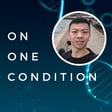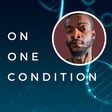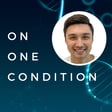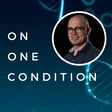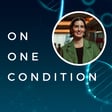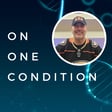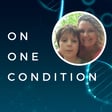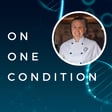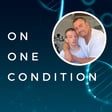Become a Creator today!Start creating today - Share your story with the world!
Start for free
00:00:00
00:00:01

Episode 51: Andrea Sinclair - Polyglandular Autoimmune Syndrome
Andrea shares her journey with Polyglandular Autoimmune Syndrome (PAS) and its complex challenges. Her story spans a life shaped by resilience and a relentless pursuit of better health outcomes, offering invaluable insights into living with rare, chronic conditions. Andrea speaks candidly about her experience, including her battles with diabetes, adrenal complications, and the transformative impact of receiving islet cell transplants. Her optimism and strength shine as she recounts triumphs over immense challenges.
The song that Andrea chose is Higher Ground by Stevie Wonder.
Transcript
Introduction to 'On One Condition' Podcast
00:00:00
Speaker
Hi, I'm Sylvain Bertolo, and you're listening to On One Condition, a podcast to raise awareness about health conditions by listening to people who leave them every day.
Understanding Polyglendular Autoimmune Syndrome (PAS)
00:00:10
Speaker
My guest today is Andrea St. Clair, and we're going to talk about polyglendular autoimmune syndrome, also known as PAS. Hi, Andrea. Thanks for joining me. How are you doing? I'm great, Sylvain. How are you? Yeah, I'm doing great. Thank you.
00:00:30
Speaker
good So as everyone who listens to the podcast knows, I love starting with a song. So which song did you choose and why? I chose the song Higher Ground by Stevie Wonder. I chose that song because ah it was released the year that I was born.
00:00:53
Speaker
I grew up listening to Stevie Wonder and Edmonton, Alberta. Canada was my mother when I was very young. He was one of her favorites. And then I really, I just, it's such an empowering song to me. and It's something that just, I feel very deeply. I think just because I had listened to it from such a young age. And then when it was re-released by the Red Hot Chili Peppers, um ah which is actually my favorite band,
00:01:22
Speaker
um it just had it It just had a ah ah new meaning for me at that time. And I can't help but want to move when I listen to it. It just makes me feel alive. I i get that. And ah one of my favorite songs is by Steve Wunder as well. It's Living from for the City. Oh, I know. I love that song. It's a great song.
00:01:49
Speaker
Yeah. Should we talk about music?
00:01:54
Speaker
it Sounds great. had No, so we're here to talk about you and talk about polyclandula autoimmune syndrome.
Personal Experiences with Autoimmune Disorders
00:02:06
Speaker
It's quite a complex name in itself. So would you, are you able to explain what it means? Sure. um It actually goes by a few other names. It's also been known as Schmidt syndrome,
00:02:20
Speaker
or polyglandular deficiency syndrome type two. It can also be referred to as autoimmune polyendocrine syndrome type two. So basically what it comes down to is that it's a cluster of several autoimmune disorders that present in one individual. And it and it has some pretty specific diseases,
00:02:45
Speaker
ah One of them is the autoimmune thyroid disease, such as Graves' disease or hypothyronism. I think I started to, that was the first um disease that I was diagnosed with at the age of eight. Then there's primary adrenal insufficiency, also called Addison's disease. ah Type 1 diabetes mellitus almost always presents and TAS type 2.
00:03:13
Speaker
um And then there are a few others that can include a skin disorder, ah problems with sex organs, et cetera. And the reason that the body, what happens essentially is that when you have um specific endocrine glands, and endocrine glands are the ones that produce hormones in the body, what happens is my body doesn't recognize those cells as my own cells. They recognize them as foreign bodies and they will attack those cells thinking that they're invaders. So for instance, with the type 1 diabetes, the cells of the pancreas, which are known as islet cells, as I-S-L-E-T, um my body just doesn't recognize those as helper cells.
00:04:10
Speaker
so It attacks those cells and as a result, I end up with diabetes mellitus because those cells just don't work in my body. So it's a bit of a, it's a bit of a, it's a rare disease for sure. um it It affects about 14 to 20 cases per million people in the world at the moment.
Managing PAS: A Multidisciplinary Approach
00:04:34
Speaker
And that's according to the ah National Association of Rare Disease.
00:04:39
Speaker
So yeah, it's rare for sure. um And the best way to manage Polyglandular Autoimmune Syndrome, um first of all, sometimes it's hard to diagnose because it's essentially one disease after another. And it's essentially how it's treated at the same time. So I think more and more, ah I can't speak for Europe, but in North America, um it's a multidisciplinary approach that's taken where you have several doctors that all specialize in different things or one endocrinologist. And in my case, the diabetes type one has been the loudest of all those diseases that I have um had to live with over the years. so Well, yeah, I can imagine
00:05:32
Speaker
that like you You don't realize, but hormones really regulate so many things in your body. So I can imagine they can have a very large impact and be quite difficult to to manage because hormone imbalance ah we know can can be very difficult to to live with.
00:05:54
Speaker
So you've mentioned ah type 1 diabetes. What other ah hormone deficiency or hormone imbalance do you have that affects you? So I have um hypothyroidism, also called Hashimoto's hypothyroiditis, which is the which is where the thyroid gland is slow to run. So it doesn't produce the correct amount of thyroxin for the body. um That's one of the easier ones to treat. I take one pill a day and it helps to regulate that hormone for me. Then I was diagnosed with type 1 diabetes mellitus when I was about 16. And a few years after that, I started to notice patches on my skin where the pigment has actually left.
Dealing with Hormone Imbalances and Adrenal Issues
00:06:53
Speaker
oh uh, it's called vitiligo and it's the, it's the same thing that Michael Jackson purportedly was dealing with where the, the, the, there's a loss of pigment in certain places in the body. It's most notably seen, uh, in the face and in the joints of the body. So I sort of started out at my ankles and, um, now it's actually spread to quite a lot of my face, but, so um,
00:07:21
Speaker
I think it's more noticeable in people with with ah more melanin in their skin than I have. So a little bit of makeup, and I seem to be able to deal with that quite well. um The other sort of ah problem that I suffer with, which not everybody necessarily does, is adrenal issues. ah The adrenal glands are extremely important. um They provide the hormones that um help us with adrenaline, ah cortisol, which is a critical stress hormone. um And I have also had Pushing syndrome, which is where there is too much cortisol in the system or something called hypercortizolemia. And over time, when you have too much cortisol in the system,
00:08:16
Speaker
What it does is it depletes the muscle in the system. It also depletes bone density. You gain weight. It's a it's a pretty difficult one to manage, to be honest with you. It can be brought on by something like a tumor in the adrenal gland or in the pituitary gland of the brain, because those two talk to each other.
00:08:44
Speaker
um Or it can also be brought on by medication. So the first time I had adrenal problems was in 2010. I had an adrenal tumor that was removed surgically. That was the only real treatment that was effective at the time. You also have like incredibly high levels of cholesterol, your heart races. I mean, there's there there is a lot to it. I got very, very ill and it can be fatal if untreated.
00:09:14
Speaker
So it was pretty severe. Um, but I did get the treatment. I did have the surgery and you know, after two or three years of very slowly tapering down on, uh, replacement hormone therapy, I had, I had a normal life again. It was, it was pretty incredible. Um, took a long time. I lost the ability to walk for a number of years. And with, uh, about three years of physiotherapy, um, I was able to regain most of my ability to walk. So I can't run any anymore. Um, but I'm also getting older. So maybe I'm, maybe that's, yeah it's just a little bit more difficult. Um, but I, I mean, ah I really could have had some serious scar tissue and, um, I worked very hard to not let that happen. And then last year, um, I was on major corticosteroids for breathing issues as a result of, of COVID-19. Um,
00:10:14
Speaker
And so I, same thing happened. I gained a lot of weight. Um, I lost a lot of bone and muscle. Um, I'm back in physiotherapy. Um, but I've also come back down off of the medication again. And, um, it's just a slow process, but in time, I'll, ahll I hope to get back to my healthiest state again. So, I mean, there's a lot to it, as you say, hormones in the body are.
00:10:43
Speaker
how the body talks to, you know, how it works the systems. And um the most important thing for me is that the adrenal problems and the diabetes um management so are counterintuitive. So let me explain that ah as briefly as I can. So I lost my adrenal gland, I lost one of two. And the second one, because the first one had been so hyperactive, it sort of got really tired and said, Well, I'm not really needed around here. So I'm just gonna sort of wither away and not not I don't need to work as hard. So I'm not going to when I and then when the yeah when the hyperactive adrenal gland was removed, the remaining one
00:11:40
Speaker
didn't wasn't able to kick back into shape, so to speak. So I now take a daily dose of prednisone in order to try and simulate what my body would naturally make on its own. If I get sick, I need more of that steroid. and And that can go into quite large numbers, um depending on what kind of illness I have. But the other problem with that is that that hormone,
00:12:08
Speaker
blocks insulin from working correctly. So the higher the dose of prednisone, the more difficult it is for insulin in the body to get utilized. So I need more insulin to work. i would If my prednisone is high and my cortisol is high, then I need to take much more insulin ah for my body to be able to utilize it correctly.
00:12:35
Speaker
And that's a very, very difficult thing to balance. You know, our bodies are made to not have to do this externally. yeah yeah so It's supposed to be all done automatically without you having to think about it. It's pretty amazing with what our bodies are capable of, but to try and understand that and then replicate it um as an individual is very difficult to balance.
00:13:03
Speaker
So, um, so for me, type one diabetes has been very difficult to manage because I wasn't always aware that I had this extra
Living with Physical Limitations of PAS
00:13:12
Speaker
course all on board. I was very athletic. I did lots of, um, high, uh, sort of medium to high risk activities, uh, as I was in my twenties and thirties, like white water rafting and, um, mountain climbing and, and rock climbing. And I was just one of those people. Um,
00:13:32
Speaker
and and And then my body just wasn't able to keep up any anymore. So ah my diabetes was always difficult to manage. I was what they called a brittle diabetic, which meant that my sugars were difficult to control. I couldn't quite get my blood sugars within the correct range. They were often way too high, made me so more susceptible to illness, more susceptible to infection, things like that.
00:14:02
Speaker
Okay. um I also didn't know, like I said, that I had high levels of cortisol running through my body and neither did my doctors. Okay. So it was assumed that I was non-compliant as a patient. No matter how hard I worked, I couldn't seem to quite get it. And when you're labeled as a non-compliant patient by your physicians, when they think that you are not doing what you should be doing in order to um manage your condition.
00:14:37
Speaker
i think it's I think it's a difficult thing for them to treat you. Makes it more challenging. yeah um And they also think that you're lying. Really? Sure. That's an important thing to understand. It wasn't until I was 34, 35 that we um and unraveled this whole thing and and
00:15:05
Speaker
That's what makes Polyglandular Autoimmune Syndrome difficult to to diagnose. Yeah. as i Can you imagine? You have to have multiple endocrine issues before it's recognized. and Okay. Yeah.
00:15:20
Speaker
So ah I'd like to go back to something you a few things you you talked about in passing. So you you said that you used to be very active, like do semi-extreme sports in a way. um Then then you you mentioned not being able to walk for a period of time, but also losing muscle mass and and bone mass.
00:15:48
Speaker
How do you cope with it? how it Was it hard for you to to accept that you couldn't do all those activities anymore? How did you cope with not being able to walk? What a great question. I coped by understanding that this was a temporary issue, by
Diet, Insulin, and Adrenal Management in Diabetes
00:16:12
Speaker
relying on my medical team to know what they were doing.
00:16:16
Speaker
and by being personally informed. So the more information I knew about what was happening, the more empowered I was to mentally prepare myself for what was necessary.
00:16:29
Speaker
um And I think that I just am one of those people that has a tenacity um that is born out of dealing with multiple chronic illnesses since I was a young child. and okay really um yeah When you know that you are somehow compromised physically as the as a person who is aging slowly over many years, you don't take things for granted as as much, I hope. and so That's what I
00:17:10
Speaker
can say for myself anyway. As in you challenge that as in you challenge your your medical team, is that what you mean? I challenge myself as well, right? I challenge the people around me. I challenge my family um to to look at their lives and understand that this is finite and we are here for a short time, no matter what that is, and to make the the the very best of it.
00:17:40
Speaker
And that's what I've been trying to do since I was young. I also embraced the idea of having chronic conditions and volunteered for um organizations that were dear to my heart for many years. um I made it important in my life, but um focused on the positives. What can I do about this? What is my legacy? What can I help people?
00:18:09
Speaker
of the future to how can they benefit from what I'm doing today? Yeah, that's a very good mindset to have. Again, I'd i'd like to go back to something you you said about managing your blood levels. From what you said, it seems that you need to follow a specific diet. Is that right or not?
00:18:38
Speaker
Yes. So I need to follow a fairly specific diet. Um, and I manage my diabetes with insulin, which I've been doing since I was about 16 years old. I'm a lot older than 16 now. Um, I've had many years of experience. Um, and as I was saying, uh, no matter what I did, no matter what protocols I followed, no matter what my diet or exercise regimens were every day, I was unable to.
00:19:08
Speaker
properly manage and control my blood sugar levels. And that was because of the adrenal problems I was, think ah nobody was aware of. So what ended up happening for me was that over the years, I started having, you know, some complications from having long-term diabetes mellitus. And you can read about what those symptoms are, but one of the biggest symptoms for me was not being able to feel a low blood sugar as it came on. So um I'm not sure how to explain it very well. But um if you have too much insulin in the body and not enough carbohydrate, um that can result in what's called a low blood sugar. And that can happen very, very quickly. And it can be fatal if not treated.
00:20:04
Speaker
you have very high blood sugars for a long period of time. That can also ah be very detrimental to the body, but not as urgent. So a low blood sugar needs to be treated immediately. ah And what would happen if I wasn't able to treat that, or or if i you can feel the symptoms coming on, ah what you'll notice is a little bit of lightheadedness perhaps, a little bit of cognitive impairment,
00:20:35
Speaker
Um, your, your body will shake, your hands will shake. You'll feel a little bit of tingling. Um, and it's quite noticeable. So, um, I think that most people who have used insulin and have experienced a low blood sugar, they can tell you what it feels like. Um, and if it continues for too long, you'll have a seizure of some sort.
00:21:01
Speaker
And you don't want to, you don't want to do that. No, no. ah When you say that it has to be treated quickly, um, quickly, is it in minutes? Oh, absolutely. Immediately. And you can treat it with, uh, well, all you want to do basically is get as much sugar into your body as you, as you can, a reasonable amount of sugar. Um, because you don't want to, you don't want to go high again. Right. So you want to treat it and then sustain it. And you can do that with candy.
00:21:31
Speaker
Um, it's recommended to use juice or, uh, some sort of, of, of soda pop. Um, um, something that will, will be absorbed by the body quickly. There are products that you can get at the drugstore to help restore your blood sugar levels as well. Um, and, um, yeah, and then you're back to normal, really. I mean, it's, it's quite a, quite a, it's quite a quick, uh, it comes on quickly.
00:22:01
Speaker
and then it's treated and then just as quickly you're back to normal. nice So so yeah that's what something scary, but that can be addressed quite easily um in a way. yeah And then if you start feeling the symptoms of a low blood sugar coming on, that's your cue to get whatever you're your treatment of the day is, right? So, um you know, it's, it's fairly easy to, um to know when that is. Now, what happened to me over time, over a long period of time, because I've had diabetes for more than 35 years now, um was that I stopped feeling those low blood sugar symptoms. out That those those triggers, those warning symptoms that would go to my brain and tell me, oh, you don't have enough glucose in you ah disappeared.
Advancements in Diabetes Treatment
00:22:59
Speaker
And so I would go from being a normal person at work to dropping to the floor and needing an ambulance to come to treat, to, to treat what was happening. And that's really scary for the people around you as well. yeah Nobody wants to work with somebody who goes from zero to or a hundred to zero. Um, and you know, uh, it's scary for my family and it's scary for me. I don't want to go to bed at night and wonder if I'm going to wake up the next day. yeah well it's yeah So with with having diabetes for for this amount of time, I know that there's been a lot of research and I'm aware of a lot of clinical trials addressing diabetes.
00:23:50
Speaker
Have you seen from your point of view an evolution in the quality of treatment you get and the way you can monitor your sugar levels? Absolutely. When I was first diagnosed, we used to have to urinate on a stick in order to have a reading of how much glucose was in the system. And now um we have ah monitors that can go on different parts of our body that not only can help us with continual readings, but can also provide insulin as we need it.
The Life-Changing Impact of Islet Cell Transplants
00:24:29
Speaker
and um and in some it's It's quite miraculous, but the most incredible thing for me um was watching in the in the late 1990s in Canada, we had something called the Edmonton Protocol, which was
00:24:46
Speaker
a research project ah about something called islet cell therapy. And over the years that has turned into something which is now an islet cell transplant program. There is an actual program at the University of Alberta in Edmonton, Alberta, Canada. And I qualified for that because of, you know, how ah much difficulty I was having ah controlling those blood sugars so and because of an unawareness of when my blood sugars were dropping, for instance. So I opted to go for um this islet cell transplant. It's not for everybody and not everybody qualifies for it, but it has been life changing for me and life saving, I'm sure.
00:25:45
Speaker
at the same time. And again, and not everybody has the trouble with type 1 diabetes that I have. ah Again, it's because I have the adrenal issues um that are you know ah occurring at the same time. There's a comorbidity there. And I just feel so grateful to have qualified for and have received um now two islet cell transplants in their life. I've got a couple of questions on that. I'm very curious. First, you said not for everybody. What do you mean by that? Is it is it a difficult treatment? It is a difficult treatment in the sense that um there are immunosuppressant medications that are involved that you will have to take for the rest of your life.
00:26:45
Speaker
And there are some big side effects with that. So, um, I guess similar to a cancer patient receiving chemotherapy treatment, um, immunosuppressive therapy, uh, reduces your immune system significantly. And that's so that I don't, um, reject my new islet cells. Yeah.
00:27:12
Speaker
Is that that why you suffered during the COVID period? Well, that's a good question. i'm not sure I don't know the answer to that question.
00:27:27
Speaker
um i was certainly more ah ah so ah as ah As a transplant patient, I am very careful about ah viruses at cold and flu season, for sure.
00:27:42
Speaker
um And, um, I, I worked very hard not to, um, not to expose myself to large groups and things like that for sure during a few months of the year. I also, I'm one of those people that wear a mask everywhere. Um, I, I, you know, I, um, is, it's, you know, I'll, I'll, I don't want to stop living because I'm immunocompromised. Yeah.
00:28:12
Speaker
But at the same time, i um I want to be careful. And so I do regular activities like everyone else. And I go shopping at the mall and I enjoy sporting and music events. But I will be the one person in the room with a mask on. Yeah, yeah, yeah. And I'm very careful with hand washing and everything else. And so is my family. So um it is ah It is a challenge in that sense, and it is a choice that I made in order to um have the life I have today. But my quality of life has improved so drastically. For me, it's been completely worth it, and I would do it again. and so what What is the impact of the islet cell transplant for you? Well, I guess the impact is that it's just really helped my glucose control overall.
00:29:08
Speaker
okay Let me tell you a little bit about how it works, if that's okay. yeah ah and is is i Let me just start by saying that it's like any other sort of solid organ transplant. you have to there's There's a waiting period. You have to be ready to go if you get the phone call. um You have to have a support person with you during the process. It takes a few days to weeks to get things sort of uh, sorted out medication wise and whatnot. There's a, there's a process to go through. yeah Um, but when you're ready, um, I traveled to Edmonton, Alberta, um, and which is my hometown by the way. So shout out to Edmonton. Um, I went to the hospital, uh, the university of Alberta hospital and I was given some drugs that were heavy, immunosuppressive drugs.
00:30:08
Speaker
And then once those worked, um, I was taken to a radiology, um, exam room or a radiology suite, excuse me, where the surgery is done. And essentially what they do is, is they mix donor cells and those are cadaver donors. Um, so amazing families have, have made the choice to help people like myself and, um,
00:30:37
Speaker
I'm so grateful for that. So cells are then mixed with another solution and and placed in a bag that looks sort of like an IV bag. And that solution helps to um keep those cells healthy while they're while we go through the process. So long story short, you go into the radiology suite where the surgeons are waiting and you're surrounded by by monitors and it's fascinating to be honest as a patient ah because you're you're aware, you're sedated but you're still aware of what's happening. um You have a numbing ah medication put on your skin right by the rib cage because what happens then is the catheter is inserted into the portal vein that leads to the liver.
00:31:34
Speaker
And essentially, the cells travel down from the the container that they're they're sitting in, and they travel down through the portal vein and into the liver. And then once that's done after a few minutes, um you lay on one side for the next four hours while those cells settle in, and they set up a graft. And that graft eventually, after several days,
00:32:04
Speaker
or however long it takes, ah start producing insulin. So because my pancreas is literally broken, um the the cells are transplanted into the liver and the liver acts like a surrogate and houses those islet cells and those islet cells produce insulin.
Gratitude for Medical Research and Trials
00:32:27
Speaker
That's incredible. and It is incredible. And I ah hadn't heard about it before you mentioned it.
00:32:36
Speaker
I'm surprised that it's not known more ah globally. ah may i mean I'm not keeping track of of the evolution of ah treatment for diabetes, but do you know if that's something that's accessible to many or is it or are you in a position where you get access to it, but it's not quite um broad yet. Exactly. So this is a fairly new experience. um I think I was number 219 or something like that in the world, let alone in Canada. um They just opened it up to Canadians from coast to coast within the last five years, if I'm not mistaken.
00:33:26
Speaker
Um, but if anybody has any questions or they want to know more information about this, cause I'm not really qualified to say what research is being done across the globe. Um, they can, uh, visit www.ilat.ca. And that is, um, a webpage that will bring them to the Alberta islet transplant clinic. And, um, from there they can look into further research and development.
00:33:56
Speaker
of of what is happening. um Dr. James Shapiro um is the head of the transplant clinic. um And ah thanks to him, I was accepted as a patient. And um I just can't believe how different my life is compared to where I was going about 10 years ago.
00:34:25
Speaker
Yeah, my first transplant was in 2014. There's a about 60% of patients at the moment that I'm aware of um have those islet cells last about five years. So yeah the the unfortunate thing is they can only transplant X number of cells.
00:34:52
Speaker
And it's not nearly enough. is It doesn't come close to the number of cells that you're born with, for instance. Um, so they work really hard for as long as they can. And then sometimes you need a supplemental, uh, transplant, okay which is what I had again in 2019. I mean, it's not a cure. Let me just, I have to, I have to say it this is not a cure for type one diabetes. Uh, but it's certainly.
00:35:20
Speaker
is going down the past two or what i believe will be a cure in the future yeah that sounds really amazing and this is why I'm so passionate about like this podcast and what I do.
00:35:39
Speaker
work that
00:35:43
Speaker
You're the proof that advancing medicine changes lives and and gives people opportunities that they wouldn't have otherwise. And I absolutely love that. So thank you for for raising it. It's amazing. If it hadn't been for the people in the clinical trials prior to this opening up to patients, ah you know, other patients, I wouldn't have been able to receive this either. So, I mean, I shout out to all the people 20 years ago who ah took a risk and and did the trial. Yeah. Yeah. And the doctors that did all the research and continue to do so every day. Yes.
Finding Peace and Connection at Yellow Point Lodge
00:36:27
Speaker
Yeah.
00:36:28
Speaker
We'll put a link off ah to the website but on the next to the podcast so people can find it easy. Thank you so much. That would make me so happy.
00:36:40
Speaker
Well, that takes me to my last question for the day, which I love asking every everyone. And I can't wait to hear your answer. ah What's your happy place? A place where you feel at peace? I have a happy place.
00:36:58
Speaker
on Vancouver Island in Canada on the west coast ah called Yellow Point Lodge, which is a special, um it's just it's just a special place. There are many different types of accommodation there. um It's right on the ocean. um I started going there about 10 years ago maybe 15 now. I don't get there every year, but um on the occasions that I do, I mean rent a little cabin, sometimes with a potbellied stove, sometimes a little more, a few more stars than that. But um it's a place where you share meals with all the other people that are staying at the at the lodge and in the other ah buildings on the
00:37:56
Speaker
on the grounds. It's in a very large protected old growth forest. It's the place where I took my husband for the first time. I only got married last year for the first time. ah Just as a... Oh,
00:38:18
Speaker
what am I trying to say? As a result of having that transplant and getting a second chance at life. i finally got married for the first time. So I was lucky enough to be able to take my mother and my husband to Yellow Point on a couple of occasions. And it's just a magical place. Well, I can feel ah can feel the magic. ah So thank you for sharing about that place.
Reflections on Mindset and Medical Progress
00:38:45
Speaker
I love that. Thank you. Well, it's been
00:38:50
Speaker
extremely um interesting learning about the islet cell transplant. I know people can't see it, but my jaw nearly dropped. um And I love what you shared, and I think that's something you you started with, which is your your mindset and focusing on the positive.
00:39:19
Speaker
And I know it's difficult, especially when it's about yourself, your health and your body, and and if you can't control what's happening inside you. But at the same time, I've heard again and again that I think that's sometimes what makes the difference. ah So great to to see that you had do have this ah this positive mindset.
00:39:50
Speaker
Thank you so much. It's been lovely talking to you. Thank you so much for for sharing on the podcast. You as well. I'm so grateful.

